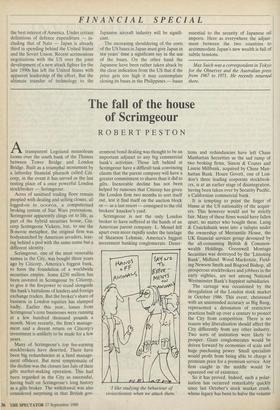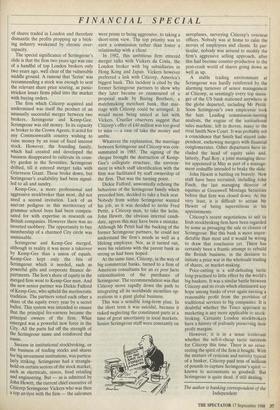The fall of the house of Scrimgeour
ROBERT PESTON
Atransparent Legoland mausoleum looms over the south bank of the Thames between Tower Bridge and London Bridge. Built as a triumphal monument by a latterday financial pharaoh called Citi- corp, in the event it has served as the last resting place of a once powerful London stockbroker — Scrimgeour.
Acres of sanitised trading floor remain peopled with dealing and selling clones, all logged-on to DOGFOX, a computerised broking system of Star Wars pretensions. Scrimgeour apparently clings on to life, as part of the hybrid securities house, Citi- corp Scrimgeour Vickers, but, to use the B-movie metaphor, the original firm was bodysnatched by American invaders, leav- ing behind a pod with the same name but a different identity.
Scrimgeour, one of the most venerable names in the City, was bought three years ago by Citicorp, America's biggest bank, to form the foundation of a worldwide securities empire. Some £250 million has been invested in Scrimgeour by Citicorp, to give it the firepower to stand alongside the bank's battalions of lenders and foreign exchange traders. But the broker's share of business in London equities has slumped badly. Earlier this year, losses from Scrimgeour's core businesses were running at a few hundred thousand pounds a month. More recently, the firm's manage- ment said a decent return on Citicorp's investment is unlikely to be made for a few years.
Many of Scrimgeour's top fee-earning stockbrokers have deserted. There have been big redundancies at a fund manage- ment offshoot. But most symptomatic of the decline was the closure last July of their gilts market-making operation. This had been regarded in the City as successful, having built on Scrimgeour's long history as a gilts broker. The withdrawal was also considered surprising in that British gov- ernment bond dealing was thought to be an important adjunct to any big commercial bank's activities. Those left behind at Scrimgeour have a difficult task convincing clients that the parent company will have a greater commitment to shares than it did to gilts. Inexorable decline has not been helped by rumours that Citicorp has given the London firm two months to sort itself out, lest it find itself on the auction block or — as a last resort — consigned to the old brokers' knacker's yard.
Scrimgeour is not the only London broker to have suffered at the hands of an American parent company. L. Messel fell apart even more rapidly under the tutelage of Shearson Lehman, America's biggest investment banking conglomerate. Deser- `I like studying the behaviour of vivisectionists when we attack them.' tions and redundancies have left Chase Manhattan Securities as the sad rump of two broking firms, Simon & Coates and Laurie Millbank, acquired by Chase Man- hattan Bank. Hoare Govett, one of Lon- don's three leading corporate stockbrok- ers, is at an earlier stage of disintegration, having been taken over by Security Pacific, a Californian commercial bank.
It is tempting to point the finger of blame at the US nationality of the acquir- ers. This however would not be strictly fair. Many of these firms would have fallen apart, no matter who bought them. Laing & Cruickshank went into a tailspin under the ownership of Mercantile House, the UK financial services group devoured by the all-consuming British & Common- wealth Holdings. Greenwell Montagu Securities was destroyed by the 'Listening Bank', Midland. Wood Mackenzie, Field- ing Newson Smith and Bisgood Bishop, all prosperous stockbrokers and jobbers in the early eighties, are not among National Westminster Bank's happiest subsidiaries.
The carnage was occasioned by the deregulation of the London stock market in October 1986. This event, christened with an unintended accuracy as Big Bang, represented a detonation of restrictive practices built up over a century to protect the City from competition. There is no reason why liberalisation should affect the City differently from any other industry. Two sorts of institution were likely to prosper. Giant conglomerates would be driven forward by economies of scale and huge purchasing power. Small specialists would profit from being able to charge a premium price for a premium service. Any firm caught in the middle would be squeezed out of existence.
So it has proved. Indeed, such a polar- isation has occurred remarkably quickly since last October's stock market crash, whose legacy has been to halve the volume
FINANCIAL SPECIAL
of shares traded in London and therefore dismantle the profits propping up a brok- ing industry weakened by chronic over- capacity.
The special significance of Scrimgeour's slide is that the firm two years ago was one of a handful of top London brokers only two years ago, well clear of the vulnerable middle ground. A rumour that 'Scrim' was recommending a stock was enough to sent the relevant share price soaring, as panic- stricken lesser firms piled into the market with buying orders.
The firm which Citicorp acquired and undermined was itself the product of an unusually successful merger between two brokers, Scrimgeour and Kemp-Gee. Scrimgeour was old money. In its capacity as broker to the Crown Agents, it acted for any Commonwealth country wishing to raise money by an issue of fixed interest stock. However, the founding family, which had created and developed the business disappeared to cultivate its coun- try garden in the Seventies. Scrimgeour drifted, till it entered merger talks with Grieveson Grant. These broke down, but Scrimgeour's availability had been signal- led to all and sundry.
Kemp-Gee, a more professional and aggressive stockbroker than most, did not need a second invitation. Lack of an anci:tnt pedigree in this meritocracy of grammar school boys had been compen- sated for with expertise in research on British companies. However there was no inverted snobbery. The opportunity to buy membership of a charmed City circle was unmissable.
Scrimgeour and Kemp-Gee merged, although in reality it was more a takeover by Kemp-Gee than a union of equals. Kemp-Gee kept only the bits of Scrimgeour which it needed, such as powerful gilts and corporate finance de- partments. The lion's share of equity in the merged firm went to Kemp-Gee men. And the new senior partner was Dickie Fulford of Kemp-Gee, who upheld the meritocratic tradition. The partners voted each other a share of the equity every year by a secret ballot. This system was intended to ensure that the principal fee-earners became the principal owners of the firm. What emerged was a powerful new force in the , City. All the parts fed off the strength of the Scrimgeour name and reinforced that name.
Success in institutional stockbroking, or the business of trading stocks and shares for big investment institutions, was particu- larly striking. Scrimgeour had a strangle- hold on certain sectors of the stock market, such as electricals, stores, food retailing and engineering. But — as is admitted by John Hewitt, the current chief executive of Citicorp Scrimgeour Vickers who was then a top analyst with the firm — the salesmen were prone to being aggressive, to taking a short-term view. The top priority was to earn a commission rather than foster a relationship with a client.
In 1982, this ambitious firm entered merger talks with Vickers da Costa, the London broker with big subsidiaries in Hong Kong and Japan. Vickers however preferred a link with Citicorp, America's biggest bank. This incident is cited by the former Scrimgeour partners to show why they later became so enamoured of a proposal made by Baring Brothers, a matchmaking merchant bank, that mar- riage with Citicorp could be arranged. It would mean being united at last with Vickers. Crueller observers suggest that Citicorp's offer of £40 million was too good to miss — a case of take the money and amble.
Whatever the explanation, the marriage between Scrimgeour and Citicorp was con- summated in 1985. The signing of the cheque brought the destruction of Kemp- Gee's collegiate structure, the environ- ment in which staff identification with the firm was facilitated by staff ownership of the firm. That was the turning point.
Dickie Fulford, unwontedly echoing the behaviour of the Scrimgeour family which preceded him, decided to take a back seat. Nobody from within Scrimgeour wanted his job, so it was decided to invite Fred Pettit, a Citicorp man, to take the helm. John Hewitt, the obvious internal candi- date, agrees this may have been a mistake. Although Mr Pettit had the backing of the former Scrimgeour partners, he could not understand the firm's needs as well as a lifelong employee. Nor, as it turned out, were his relations with the parent bank as strong as had been hoped.
At the same time, Citicorp, in the way of big commercial banks, turned to a firm of American consultants for an ex post facto rationalisation of the purchases of Scrimgeour. The recommendation was that Citicorp move rapidly down the path to integrating all its worldwide securities op- erations in a giant global business.
This was a sensible long-term plan. In the short term it was suicidal, because it risked neglecting the constituent parts at a time of great uncertainty in local markets. Senior Scrimgeour staff were constantly on aeroplanes, surveying Citicorp's overseas offices. Nobody was at home to calm the nerves of employees and clients. In par- ticular, nobody was around to modify the firm's aggressive selling approach, after this had become counter-productive in the post-crash world of shares going down as well as up.
A stable trading environment at Scrimgeour was hardly reinforced by the alarming turnover of senior management at Citicorp, as seemingly every top mana- ger of the US bank stationed anywhere in the globe departed, including Mr Pettit. Soon Scrimgeour's own employees took the hint. Leading commission-earning analysts, the engine of the institutional sales machine, left in droves, many to the rival Smith New Court. It was probably not a coincidence that Smith had stayed inde- pendent, eschewing mergers with financial conglomerates. Other departures have in- cluded the head of equity sales and, latterly, Paul Roy, a joint managing direc- tor appointed in May as part of a manage- ment reshuffle intended to brake the slide.
John Hewitt is battling on bravely. New staff have been recruited, including John Finch, the last managing director of equities at Greenwell Montagu Securities before that firm was closed down. At the very least, it is difficult to accuse Mr Hewitt of being superstitious in - his appointments.
Citicorp's recent negotiations to sell its Irish stockbroking firm have been regarded by some as presaging the sale or closure of Scrimgeour. But this bank is more unpre- dictable than most and it would be wrong to draw that conclusion yet. There has certainly been a frantic attempt to rebuild the British business, in the decision to initiate a price war in the wholesale trading of shares, or market-making.
Price-cutting is a self-defeating tactic long-practised to little effect by the world's big bankers. It was a similar battle between Citicorp and its rivals which eliminated any hope among banks of ever again earning a reasonable profit from the provision of traditional services to big companies. It is doubtful whether the Tesco approach to marketing is any more applicable to stock- broking. Certainly London stockbrokers have a history of jealously preserving their profit margins.
However, it is in a sense irrelevant whether the sell-it-cheap tactic succeeds for Citicorp this time. There is no resur- recting the spirit of the firm it bought. With the mixture of cynicism and naveity typical of a banker, Citicorp paid tens of millions of pounds to capture Scrimgeour's spirit known to accountants as goodwill. But Scrimgeour is quite dead, if still dealing.
The author is banking correspondent of the Independent



































































 Previous page
Previous page